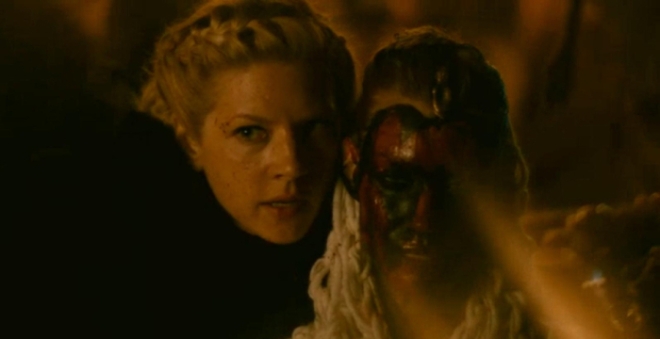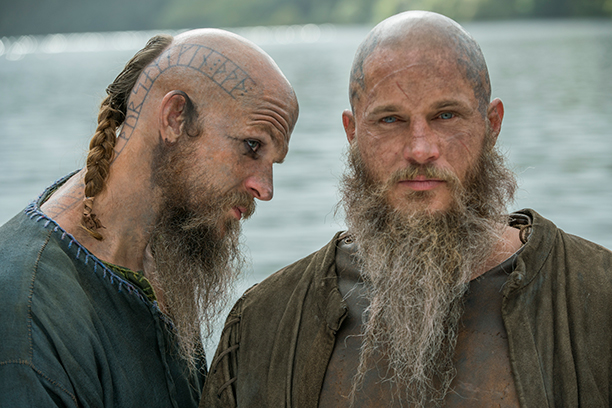So it’s been a few weeks since the last time I wrote about my continuing … love-hate relationship isn’t right. Enjoyment-bafflement relationship? … with Vikings. So let’s take a look at what’s been going on since then.
So Lagertha and Aslaug are set up as rivals this season, a rivalry that gets off to a good start when Lagertha imprisons Ubbe and Sigurd and takes Kattegatt back from Aslaug. In the meantime, Ivarr and Ragnar get shipwrecked on the English coast. The irritated crew mutiny, but Ivarr stabs them up to reinforce the point that he is not to be messed with. Bjorn, together with Halfdan and Harald plus Floki, rocks up to Rollo’s castle to meet the kids. Rollo decides to tag along on Bjorn’s Mediterranean adventure because, I dunno, he longs for the old days of sailing the wide world etc.

Anyway, Ragnar and Ivarr arrive in Winchester only to find out that Ecbert isn’t home, the one thing they were not counting on. Aethelwulf does what Aethelwulf does and has them locked up. Aslaug gets one of yer Viking funerals that everyone loves so much while Lagertha gloats. Ecbert comes home and gets Ragnar out of the dungeons to do some devious Ecbert stuff with him. Young Magnus shows up for the first time in his older version, and Ragnar says he never had sex with whatsername, which messes things up a little. There are a lot of children of dubious parentage at the West Saxon court, aren’t there? Anyway, Ecbert has a good old jaw with Ragnar about the absurdity of religion or destiny or something, or maybe just their shared love for Athelstan. Ragnar sets up his plan to introduce — dare I say it? — the main plot of the series! And only 40-whatever episodes in.
This show has a real problem with deviousness, which I think is a combination of budget concerns and the influence of Game of Thrones. See, in Game of Thrones, everyone is always going into negotiations with uncertain allies and then getting assassinated. This is because the setting of Game of Thrones is a functional medieval society that is now falling apart. So people keep relying on outmoded concepts of law or political influence to protect them and discovering that they no longer apply, while a new breed of bastard and/or hero thrives.
But we’re supposed to believe that this is pretty much how things work in Vikings. And logically, all the characters should know that. That being the case, why doesn’t anyone act like it? Lagertha makes a peace agreement with Aslaug — who is, remember, widely believed to be descended from a literal god — and then shoots her in the back as she walks away. In front of everyone! That has got to be a blow to her reputation, surely.
(Does that mean that when Aslaug was sleeping with Harbard she was having sex with her own grandfather? Ick.)
Anyhow, my point is — given that Ubbe and Sigurd presumably know that anyone could turn on you at any time, why would they just walk into a trap like a couple of idiots? If Aslaug knows (and remember, she’s supposed to be the politically savvy one) that Lagertha, a famous general with a full-sized army, can march into her town without anyone knowing until she’s forming a shieldwall at the city limits, then why on earth would she allow Bjorn to sail off with all the warriors? (Unless Bjorn’s in on it, of course, which would be kind of neat, but still.) Over and over, this show sets up a political dispute and then has it resolved by someone getting knifed in ways that make dramatic sense but little real-world sense.
Now, I’m not saying people don’t get assassinated or massacred in real life. But successful assassinations and massacres as means of ending conflicts are probably quite rare. Usually killing one guy or even one group of guys doesn’t solve the problem like you’d hope it would. Whack a Viking warlord, and you may find that they have uncles, cousins, brothers, followers, whatever, who will come back to haunt you. Those people (usually) don’t exist in this show because of principles of narrative economy, but I dunno, it feels like a cheat. I’m aware I’ve said this before.



